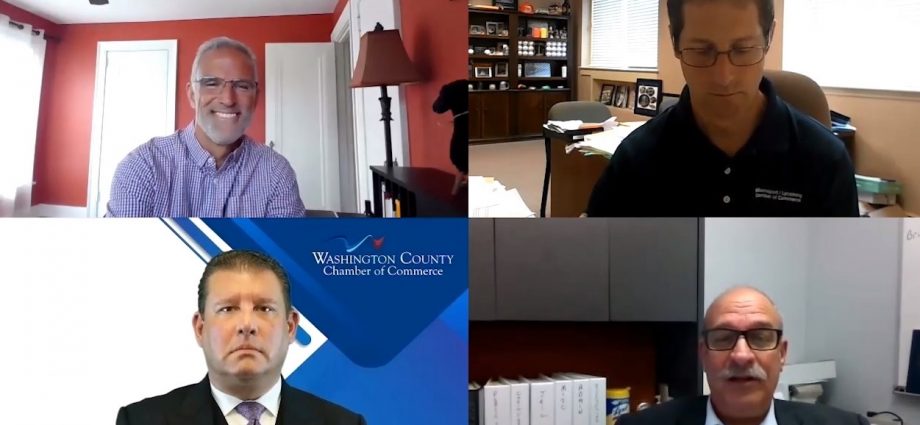Commissioner Alan Hall of Susquehanna County (above, lower right) was one of three panelists in a statewide discussion about Marcellus Shale and Our Communities moderated by George Stark of Cabot Oil & Gas Corporation (upper left) on Sept. 24.
Improvements in education, quality of life, and community resilience were common threads in a virtual Think About Energy webinar moderated by Cabot external affairs director George Stark recently. Participants included Susquehanna County Commissioner Alan Hall; Jason Fink, President & CEO of the Williamsport/Lycoming County Chamber of Commerce; and Jeff Kotula, President of the Washington County Chamber of Commerce.
“We want to make certain that everyone has a real good sense of the positive stories that are taking place,” Stark said at the onset of the hour-long broadcast. “I fully believe that, at the end of today, you’re going to get a real appreciation for how this industry has moved Pennsylvania forward.”
Hall spoke of Susquehanna County’s rural culture and a time, just over a decade ago, when blue stone and farming were the primary industries, and most farms had 90 heads of cattle or less. “A lot of those farms were failing. Young people would leave and not move back,” Hall explained.
In addition to the millions of dollars in Act 13 disbursements returned to state, county and municipal governments for investments, $2 billion in gas royalties have helped farmers there enhance their herd stock, construct new buildings and update technologies and equipment. Contrary to the rhetoric of detractors that gas drilling destroys property value, cost per acreage in Susquehanna County has risen from $600 to more than $10,000 in the past 10 years, Hall related. He credited companies like Cabot, Meshoppen Stone, and Diaz Industries for their support of trade schools and higher education.
“This industry has come into this area and created opportunities with local schools. Susquehanna County would not have a college if not for natural gas,” said Hall*. “We have created such an opportunity for our young people to get the certifications and degrees that they need.”
Stark solicited responses to a variety of questions as they came in from audience members. Panelists were largely in agreement on most of the issues, but also offered unique examples of what their respective counties have gained from their relationships with industry leaders and partners.
Kotula said the benefits derived from natural gas have had “an all-encompassing effect” on Washington county. “They’ve really become a great part of our community.” Gas drilling and the businesses that walk hand-in-hand have brought new residents who are building new homes and are engaged with local schools and other community organizations. Just as important, long-time residents and business owners have experienced growth as retailers and suppliers.
Hall told a similar story of booming businesses as an indirect benefit of gas production. “We have hardware stores have tripled in size,” he offered as an example. “It’s a trickle down effect.”
Fink related that the gas industry could not have arrived at a better time to lift Lycoming County’s sagging economy. “We’re very excited to see how this has grown over the last decade,” he remarked. Chamber and elected officials developed a better understanding of what jobs were available and how family-sustaining wages would effect the greater community. “It was very fortunate for us to have opportunities for people to jump into a new industry.”
The trickle down effect, Hall suggested, can also be seen in a renewed community spirit. Companies like Cabot have initiated capital campaigns that led to the construction of a new hospital and library. He noted that local businessmen Adam Diaz and Robert Heath were able to start new businesses, providing more jobs. “And, because they have been successful and done well, they’ve turned around and done some special things,” he explained, citing donations of new sneakers and winter wear for local school children as examples. “The giving back by people to the non-profits and the community is unbelievable.”
Panelists expressed their gratitude as well for the investments of Cabot, Williams and other companies in education, from fourth graders navigating the Mobile Oilfield Learning Unit (MOLU) to investments in the School of Petroleum & Natural Gas and a CDL training center in the middle of the Susquehanna County gas fields. Fink credited Shell Oil Company for partnering with Williamsport’s Penn College for courses in the production of plastics and polymers. “Their investments in state-of-the-art equipment is on par with what the students will use upon graduation and moving into the workforce,” he noted.
“We tend to forget that these places were not always booming,” Stark remarked as he began to wrap up the conversation.
Hall summed up his presentation with an overview of the “remarkable turnaround” experienced by a county that was once $13 million in the red with a pension fund was only about 43 percent funded. “Our courthouse was 200 years old and falling down around us. We had a 130-year old coal furnace still in use. We’ve put over $10 million into the courthouse and installed modern natural gas boilers that are running clean and efficient,” said Hall. “We are currently building a $19-million safety facility. All of this stuff would have to be built at some time, but we were able to do all of those things without raising taxes or borrowing money.”
*Editor’s note: Commissioner Hall was unaware at the time of this webinar that the School of Petroleum & Natural Gas would be moving to Tunkhannock. (Read it here: http://www.endlessmtnlifestyles.com/school-of-petroleum-natural-gas-moving-to-tunkhannock/)
